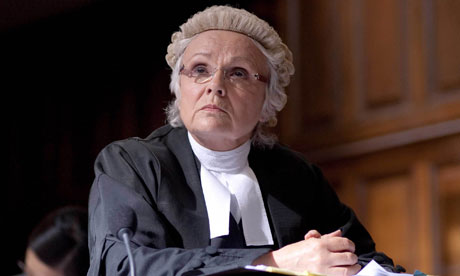Forget the legal inaccuracies, the irrelevant sub-plots and the intrusive commercial breaks. What really killed off ITV’s The Jury was a lack of confidence in courtroom drama.
It looked promising enough. Written by the Oscar-nominated author of Frost/Nixon and The Queen, Peter Morgan, The Jury was screened over five consecutive days and starred Julie Walters as an admirably irritating defence QC with a touching addiction to nicotine.
According to Morgan, it sought to ‘unlock the personal stories’ of the jury ‘by having a crime whodunnit going right through it like a skewer.’

The whodunnit part was reasonable enough, and seemed to be partly based on the case of Barry George, the man convicted and then acquitted of the murder of Jill Dando following the exclusion of microscopic forensic evidence.
Its real stars were the jurors, a disparate bunch all with their own problems to sort out at the same time as deciding the fate of an alleged serial killer. The teacher having an affair with a student, the immigrant hoping to move to America, the firefighter obsessed with getting a tan. So far, so melodramatic. It was after all a fictional drama, and perhaps the disregard for reality wasn’t that important. As it happened, many of the complaints about inaccuracies (a lot of them from lawyers) were themselves inaccurate.*
But what really undermined it was the lack of screen time given to the court process itself. The fictional trial lasted only five days, featured only three or four witnesses, speeches from both counsel and the evidence of the man on trial. It was probably only about 30 minutes out of the total five hours. There was some nice banter between the barristers, a few feisty exchanges with witnesses and a shrewd juror realising they weren’t being told the full story (they hardly ever are). But given that cameras are excluded from criminal trials in the UK, it was a massive missed opportunity.
Instead of courtroom drama, we got a succession of sub-plots all tacked on to each other in the hope that the viewer wouldn’t get bored. ‘WTF? Why is the juror writing to the defendant?’ ‘Who is that crazy woman trying to pervert the trial?’ ‘OMG she’s impersonating a juror!’ ‘You can’t look up a case on the internet!’ ‘Witnesses aren’t allowed to talk to jurors!’ It resulted in frustration rather than anticipation.
Private Eye’s ‘Remote Controller’ probably put it best when he wrote: ‘The material frequently suffers from the apradox of many TV legal procedurals. Although the shows are presumably commissioned because of the belief that the process is interesting, panic rapidly sets in that it isn’t interesting enough. So every jury has a juicy personal dilemma nad events such as jury-nobbling and impersonation of a juror, which must in reality be very rare, hover over proceedings.’
The audience, like the jury, was asked to reach its own verdict based on a meagre explanation of the evidence and some table-thumping commentary from the barristers. The fingerprint on the glass in one victim’s bedroom, the mobile phone ‘pinpointed’ at another’s home, the internet dates with all three women. Oh, and the bit of blanket found in the suspect’s car, which the jury wasn’t meant to know about.
There was also a staggering disregard for the victims’ families. Where were they? Oh, that’s right, they were represented by a sister and a brother who wilfully sought to pervert the course of justice and imprison an innocent man. It’s no wonder that John Cooper QC called it ‘insulting to victims of crime.’**
So for the next series (and there definitely should be a second series, despite the failure of the first), let’s have a bit more ambition. Ten hour-long episodes. Hell, make it twenty. Keep the audience hooked by exploring character rather than a succession of unnecessary and over-cooked subplots. If The Killing and the Wire can do it, why can’t The Jury? Have confidence in the courtroom, and the people within it.
*The legal advisor for The Jury was Colin Aylott, a ‘specialist defence advocate’. I expect he is now getting a lot of stick.
** Public reactions on Twitter included: ‘omg this is so scary’, ‘judi dench u rock’ [sic], ‘I know i have the attention span of a 2 year old but this is SO slow’, ‘chill out legal tweeters, it’s a drama, it’s not trying to be a documentary’, ‘the jury ended well, could have been two nights though’, ‘I want to be a barrister so bad… and i want to be a juror one day’, ‘well that’s five hours wasted.. preposterous plot twists, three jury members compromised, overacted, overegged melodrama’, and ‘perfect ending for the jury would have been final shot of juror who went off with alan lane dead in her flat.’